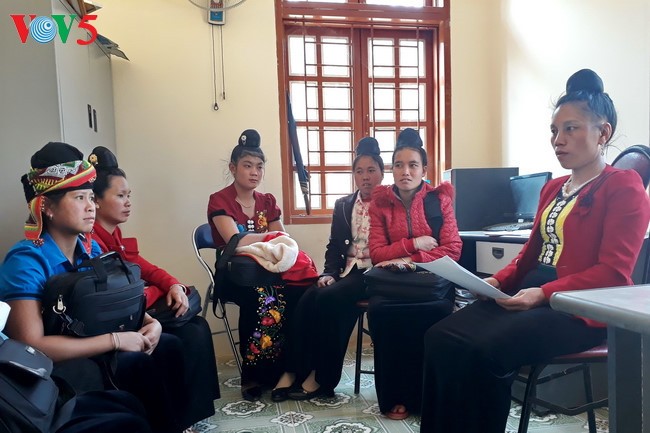Ethnic minority activist devotes to improving rural women’s livelihoods
(VOVWORLD) - After graduating from the University of Agriculture, Lo Thi Cuong of the Xinh Mun ethnic group returned to work in her native commune in Son La province. As the Chairwoman of the Phieng Pan commune’s Women’s Association, Ms. Cuong has made a significant contribution to local women’s livelihoods.
 Ms. Lo Thi Cuong (R) is showing local women the techniques for rice and maize cultivation and husbandry (Photo: Tong Duc Anh) Ms. Lo Thi Cuong (R) is showing local women the techniques for rice and maize cultivation and husbandry (Photo: Tong Duc Anh) |
Several years ago, the illiteracy rate among women in Phieng Pan commune, was quite high due to limited educational opportunity. Changing local people’s way of thinking and making them appreciate the importance of education has been Lo Thi Cuong’s primary goal. Despite poor local transportation, Cuong and her colleagues have gone house to house to encourage women to go to school. In addition to learning how to read and write, local women are learning about the law, production, and family planning. As a result, no woman has given birth to a third child in the past 3 years, and the living standard of local women has gradually improved. Ms. Cam Thi Son is a member of the Phieng Pan Women’s Association: “Ms. Cuong is an enthusiastic person. She traveled a long way to our hamlet to teach us how to implement women’s movements. We work together to communicate Party guidelines and principles of family planning to local people”.
Phieng Pan is a difficult border commune. The local economy is underdeveloped, and the terrain is broken up by unorganized and uncoordinated farming. Ms. Cuong took over the leadership of the local poverty reduction campaign, and started applying what she learned at university to raising corn, rice, and animals. After success in her household, Cuong began replicating production models with her neighbors. With support from Cuong and the Vietnam Bank for Social Policies, the local poverty rate has been considerably reduced.
After working at the Women’s Association for some time, Cuong realized that oral communication is the most effective, so it is essential to understand the language of every ethnic group. Cuong is now learning Mong and Thai to communicate better with these locals.
“I make fact-finding visits to communes to better understand their problems and help them work out appropriate action plans,” Cuong said.